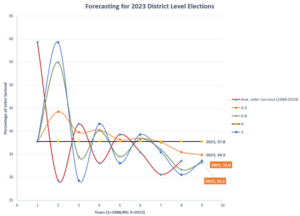Local Government Elections in Ghana are particularly poorly patronized by the voter population. If voter turnout in the last three decades of local Government elections in Ghana is anything to go by, then it is safe to predict that, less than 35% of the voter population will turnout for this year’s (2023) elections if nothing is done to change the trajectory. Despite the importance of the local governance system to any democratic dispensaton, historical trends and predictive analysis conducted on voter turnout since 1988/89 point to gross indifference of the ordinary Ghanaian voter.
Ghana’s Local Government Elections are characterised by high levels of apathy. The records show that, participation in the local government elections that followed the 1989 elections has declined so much to the worry of many local governance experts. Only the 1988/89 elections is on record to have registered the highest voter turnout till date. Since inception of the local government elections, average voter turnout is 38% with probably the lowest being the 29.3% recorded in the 1994. The December 2019[1] elections was not different in terms of voter turnout as the Electoral Commission, and the media have all recounted the low numbers recorded and have since called for national attention to help contribute to increasing voter turnout.
Several genuine reasons have been given for the low voter turnout. Research has also shown that perceived irrelevance of the assembly members office, disenchantment of voters, voter fatigue, fear of intimidation, inadequate voter education, religious alignment, long queues at polling stations and the perception that one’s candidate will not win have being given as the major reasons accounting for the low voter turnout. These factors have been addressed at various levels including the continuous education of the electorate by the National Commission for Civic Education (NCCE), creation of new polling and voting stations as well as the introduction of the Biometric Verification Devices (BVDs) which quickens the voting process, thereby reducing time spent in queues. In spite of all these, there have not been much improvement. Conversely, a recent survey by the CDD revealed that more than seven in 10 Ghanaians (76%) favour the election of MMDCEs but there is little to tell as to whether this perception will translate directly into voter turnout at the local level.
The figure below demonstrates why not much will change in the upcoming 2023 Local Government Elections. A forecasting method is conducted using simple exponential smoothing technique. Four trails are conducted using various random alpha values of 0,1,3 and 8 to predict the likely outcome to the 2023 elections.

The results shows that the behaviour of two alpha values (0.8 and 1) shows a sensitive smoothing line with the actual average voter turnout at midpoint whiles the other two (0.3 and 0) appear insensitive. The mimicking behaviour of alpha 0.8 and 1 from period 6 signals that the predictive turnout for the 2023 elections could still hover around 33%-34%. Therefore, unless there is a substantial input, turnout for the 2023 local government elections voter may not experience anything beyond the poor historical performance.
In addition, there are over 17 million qualified voters and over 38,000 voting stations on the ECs register. Yet, despite the impending elections, there appears to be very little concern among the major key stakeholders on the exact date of the district election. One would have expected that the details of the elections should be clear at the beginning of year 2023. Yet, two (2) elections including the National Democratic Congress primaries and the Kumawu by election have just gone by with little to nothing known about the 2023 district elections.
The Electoral Commission (E.C) of Ghana is expected to conduct elections for all the 216 Metropolitan, Municipal and District Assemblies (MMDAs) to elect Assembly and Unit Committee Members for the next four years i.e., 2023-2027. This is a legal provision under the article 6 (1) of the Local Governance Act 936 of 2016. The District Level Elections (DLE) in Ghana are an essential part of the nation’s decentralized governance system. Every four years, these elections give citizens a chance to actively engage in local decision-making, ensuring that power is distributed at the local level.
Even though Ghana’s Local Government Elections have significantly improved local democracy, there are still issues that need to be resolved. The general lack of knowledge and comprehension of the elections among citizens is a major problem. Public awareness campaigns about the significance of these elections and how they affect local governance should be timely and deepened. This should be well recognized in the dedication and celebration of a day, week or month on Local Governance issues particularly the elections.
Additionally, it is important to guarantee the fair representation of underrepresented groups in the political process, such as women, young people, and people with disabilities. Despite the advancements made, more has to be done to promote their active engagement and remove the structural obstacles they encounter. Particularly for the youth there should be an incentive package for their representation, this could motivate the over 40% of the electorate who are youth to identify with and drive their participation in the Local Government Elections.
Measures should be taken to improve the election process, including the strengthening of technology for voter registration and result collation, in order to increase the elections legitimacy and transparency. The EC should work towards developing a system where the electorate can vote in the comfort of their homes using their mobile devices. This could increase the turnout rate.
Ghana’s decentralization systems since introduction have been a source of learning and inspiration for many African countries. We must not look on unconcerned as the system deteriorate this way. We have a huge task as a country to reverse this trend and restore our local governance to a path of progress. The EC, NCCE, MMDAs, CSOs state institutions and development partners must awaken to this call and act immediately.
All hands must be on deck.
The writer is the Snr. Programmes Officer for Foundation for Security and Development in Africa (FOSDA)
[1] Per.Comm with EC officials indicate that, voter turnout for 2019 DLE is 33.6%










